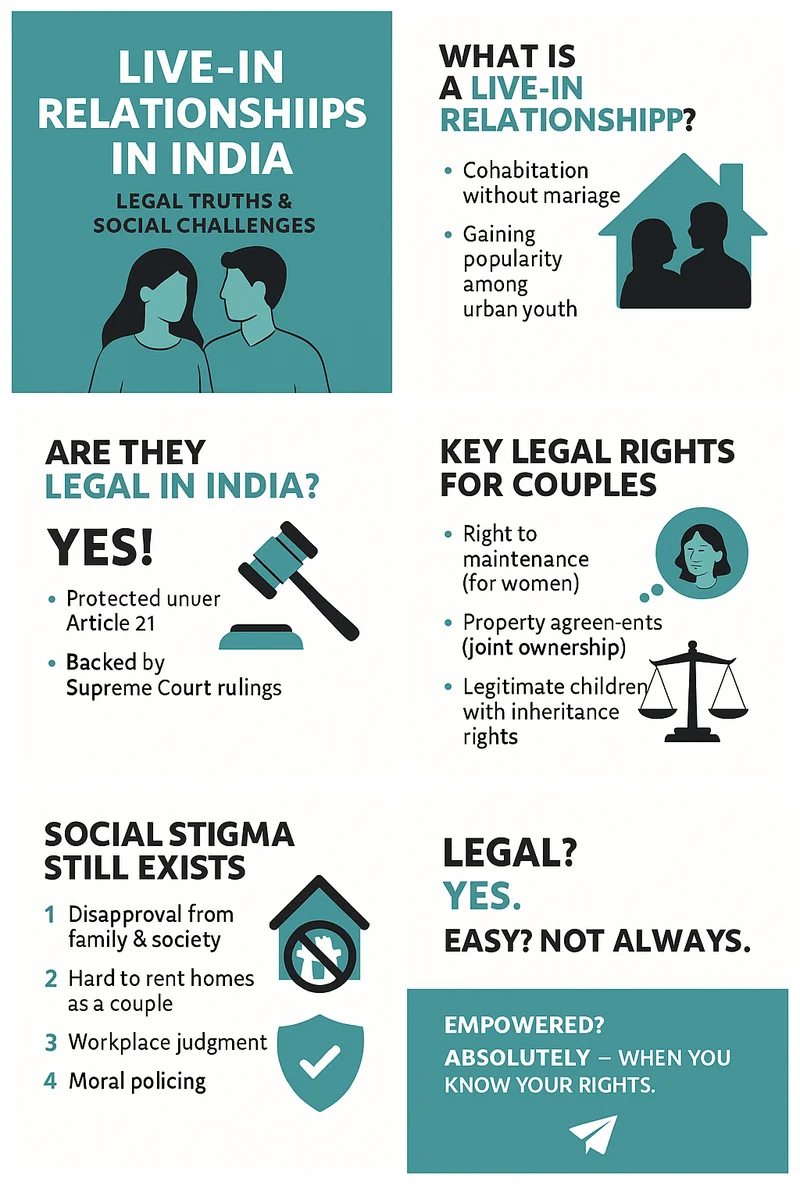
Live-in relationships are increasingly becoming a lifestyle choice for modern Indian couples, especially among millennials and Gen Z. However, while the courts have gradually recognized their legitimacy, Indian society still grapples with deeply rooted cultural resistance. This article breaks down the legal rights of live-in partners in India and explores the social realities they face, offering a comprehensive guide for anyone considering cohabitation without marriage.
Understanding Live-in Relationships in India
Live-in relationships, or cohabitation without marriage, involve a couple living together in a long-term, romantic relationship. Unlike marriage, there’s no official registration or ceremonial requirement.
Why It’s Gaining Ground:
- Greater urbanization and western influence
- Financial independence among women
- Desire to test compatibility before marriage
According to a 2023 Pew Research study, over 35% of young Indians in urban areas support the idea of live-in relationships. However, the acceptance significantly drops in rural and conservative households.
Legal Status of Live-in Relationships in India
Indian courts have clarified that live-in relationships are not illegal. In fact, they fall under the purview of the Right to Life and Personal Liberty as guaranteed by Article 21 of the Constitution.
Key Legal Cases:
- Indra Sarma v. V.K.V. Sarma (2013): Recognized live-in relationships under the Protection of Women from Domestic Violence Act, 2005.
- Lata Singh v. State of UP (2006): Asserted the right of consenting adults to live together without interference.
The Supreme Court has repeatedly ruled that consenting adults have the right to cohabit, and such relationships should not be considered immoral or illegal.
Legal Rights of Individuals in a Live-in Relationship
Though live-in couples are not automatically granted all marital rights, the law does offer several important protections:
1. Right to Maintenance
- Women in live-in relationships are entitled to maintenance under the Domestic Violence Act if the relationship is proven to be “in the nature of marriage.”
2. Property Rights
- Joint property must be legally documented to prevent future disputes.
- Partners cannot claim each other’s inherited property unless named in a will.
3. Rights of Children
- Children born to live-in couples are considered legitimate.
- They have full inheritance rights from both parents.
4. Right to Protection
- Women can seek protection from abuse or harassment under the Domestic Violence Act.
Societal Attitudes Toward Live-in Relationships
Despite legal acceptance, live-in couples often face backlash due to India’s traditional emphasis on marriage.
Social Realities:
- Families may disown or harass the couple.
- Neighbors may stigmatize or report them.
- Housing societies often deny rentals to unmarried couples.
Media representation is slowly helping, but there’s still a long way to go before live-in relationships are normalized.
Challenges Faced by Live-in Couples in India
Here are some of the most common difficulties faced:
- Social Judgment: Especially from conservative family members and local communities.
- Finding Accommodation: Many landlords refuse to rent to unmarried couples.
- Legal Gray Areas: Ambiguities still exist in inheritance and property matters.
- Lack of Documentation: Absence of formal contracts can create complications.
- Harassment: Some couples report moral policing or threats from local authorities or families.
Tips for Navigating a Live-in Relationship in India
Want to cohabit peacefully? Here are some tips:
- Consult a family lawyer to understand your rights and draft a cohabitation agreement.
- Make financial matters clear—joint accounts, rent, and bills should be fairly distributed.
- Document important decisions, including property and future plans.
- Be discreet but confident in your housing search; look for couple-friendly societies.
- Seek therapy or legal aid if facing family or societal pressure.
Conclusion
Live-in relationships in India are legally protected but not yet socially accepted across the board. As society evolves, the stigma may reduce—but until then, couples must be informed and prepared. By understanding the legal framework and societal challenges, partners can make empowered choices about their relationships.
FAQs
Q1: Is live-in relationship legal in India?
Yes, the Supreme Court has deemed live-in relationships legal for consenting adults.
Q2: Can a live-in partner claim maintenance?
Yes, women can claim maintenance under the Domestic Violence Act if the relationship meets specific criteria.
Q3: Are children born in live-in relationships legitimate?
Yes, they are considered legitimate and have inheritance rights.
Q4: Can live-in couples buy property together?
Yes, but it is advisable to have clear documentation to avoid future disputes.



